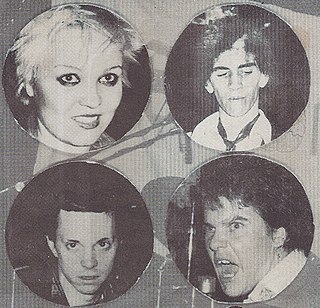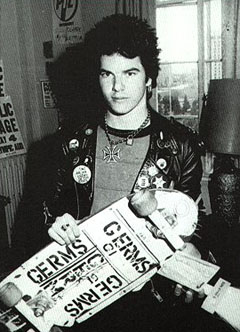
The Germs were an American punk rock band from Los Angeles, California, originally active from 1976 to 1980. The band's "classic" lineup consisted of singer Darby Crash, guitarist Pat Smear, bassist Lorna Doom and drummer Don Bolles. They released only one album, 1979's (GI), produced by Joan Jett, and were featured in Penelope Spheeris' seminal documentary film The Decline of Western Civilization, which chronicled the Los Angeles punk movement. The Germs disbanded following Crash's suicide in 1980. Their music was influential to many later rock acts, and Smear went on to achieve greater fame performing with Nirvana and Foo Fighters.

Jan Paul Beahm was an American singer who, along with longtime friend Pat Smear, co-founded the punk rock band the Germs and was best known as their lead vocalist. In 1980, he committed suicide by overdosing on heroin.

The Decline of Western Civilization is a 1981 American documentary filmed through 1979 and 1980. The movie is about the Los Angeles punk rock scene and was directed by Penelope Spheeris. In 1981, the LAPD Chief of Police Daryl Gates wrote a letter demanding the film not be shown again in the city.

The Screamers were an American electropunk group founded in 1975. They were among the first wave of the L.A. punk rock scene. The Los Angeles Times applied the label "techno-punk" to the band in 1978. In the documentary Punk: Attitude (2005), vocalist Jello Biafra of the Dead Kennedys cites the Screamers as a key influence on their group and as one of the great unrecorded groups in rock history.

Adolescents, also known as The Blue Album due to its cover design, is the debut studio album by American punk rock band the Adolescents, released in April 1981 on Frontier Records. Recorded after guitarist Rikk Agnew and drummer Casey Royer joined the band, it features several songs written for their prior group, the Detours, including "Kids of the Black Hole" and "Amoeba", which became two of the Adolescents' most well-known songs. Adolescents was one of the first hardcore punk albums to be widely distributed throughout the United States, and became one of the best-selling California hardcore albums of its time. The band never toured in support of it, and broke up four months after its release. The Blue Album lineup of Agnew, Royer, guitarist Frank Agnew, bassist Steve Soto and singer Tony Brandenburg reunited several times in subsequent years, but only for brief periods.
Top Jimmy & The Rhythm Pigs were an American rock and R&B band that emerged from the Los Angeles punk/roots music scene of the late 1970s and early to mid-1980s. Music writer Chris Morris dubbed them "L.A. punk's house band." This scene also produced bands such as The Blasters, X, Los Lobos, The Gun Club, The Knitters, The Circle Jerks, and The Plugz.
Nickey Alexander is an American drummer.
The Quick were a mid-1970s power pop band based in Los Angeles. The Quick were influenced by 1960s British Invasion bands and 1970s British glam bands, as well as by fellow Angelenos Sparks.

The Plugz were a Latino punk band from Los Angeles that formed in 1977 and disbanded in 1984. They and The Zeros were among the first Latino punk bands, although several garage rock bands, such as Thee Midniters and Question Mark & the Mysterians, predated them. The Plugz melded the spirit of punk and Latino music.
David Xavier Harrigan, also Tomata du Plenty, was an American singer of the late 1970s and early 1980s Los Angeles electropunk band The Screamers. He was also the founder of Seattle's counterculture troupe Ze Whiz Kidz. During the later part of his life he focused on painting.

GI, stylized as (GI), is the only studio album by American punk rock band the Germs. Often considered the first full-length hardcore punk album, it was released in the United States in October 1979 on Slash Records with catalog number SR 103. The album was later released in Italy in 1982 by Expanded Music with the catalog EX 11. The album's title is an acronym for "Germs Incognito", an alternate name the band used to obtain bookings when their early reputation kept them out of Los Angeles-area clubs. After (GI)'s release, the band would only undertake one more recording session, for the soundtrack album to Al Pacino's 1980 film Cruising. On December 7, 1980, a year after the release of (GI), vocalist Darby Crash died by suicide.

Lexicon Devil is a three-song EP and the second release by American punk rock band the Germs. It was also the debut output of Slash Records, and of Geza X both as a producer and as a recording engineer. The record was named after its leadoff song.

Yes L.A. is a six-song compilation EP featuring first-generation Californian punk rock bands. It was also the final release of the short-lived but influential Dangerhouse Records label.

What We Do Is Secret is a 2007 American biographical film about Darby Crash, singer of the late-1970s Los Angeles punk rock band the Germs. It was directed by Rodger Grossman, who wrote the screenplay based on a story he had written with Michelle Baer Ghaffari, a friend of Crash's and co-producer of the film. Shane West stars as Crash, while Rick Gonzalez, Bijou Phillips, and Noah Segan respectively portray Germs members Pat Smear, Lorna Doom, and Don Bolles. The film follows the formation and career of the Germs, focusing on Crash's mysterious "five-year plan", his homosexual relationship with Rob Henley, and his experimentation with heroin, culminating in his December 1980 suicide. It is titled after the first track on the Germs' 1979 album (GI).

Marc Spitz was an American music journalist, writer and playwright. Spitz's writings on rock and roll and popular culture appeared in Spin as well as The New York Times, Maxim, Blender, Harp, Nylon and the New York Post. He was a contributing music writer for Vanity Fair.

The Mau-Mau's [sic] is a band started by Rick Wilder. Following the breakup of the glam rock / proto - punk band the Berlin Brats in 1976, two years of inactivity followed before Rick Wilder updated his image and sound to more align in the wake of the Los Angeles original punk scene and formed the Mau-Mau's in 1978.

Humberto "Tito" Larriva is a Mexican-born American songwriter, singer, musician, and actor. He came to prominence leading The Plugz, one of the earliest Los Angeles punk rock groups. Since the 1990s, his main musical outlet has been Tito & Tarantula.

Brendan Mullen was a Scottish nightclub owner, music promoter and writer, best known for founding the Los Angeles punk rock club The Masque. Through Mullen's support at various nightclubs in California, the scene gave birth to such bands as the Red Hot Chili Peppers, The Go-Go's, X, The Weirdos and the Germs.

"Forming" is the debut single by American punk rock band the Germs. Released on What?, an independent start-up label, in July 1977, it is regarded as the first true Los Angeles punk record.

The Atomic Cafe was a diner located at 422 East First Street in the Little Tokyo district of Los Angeles, California.















